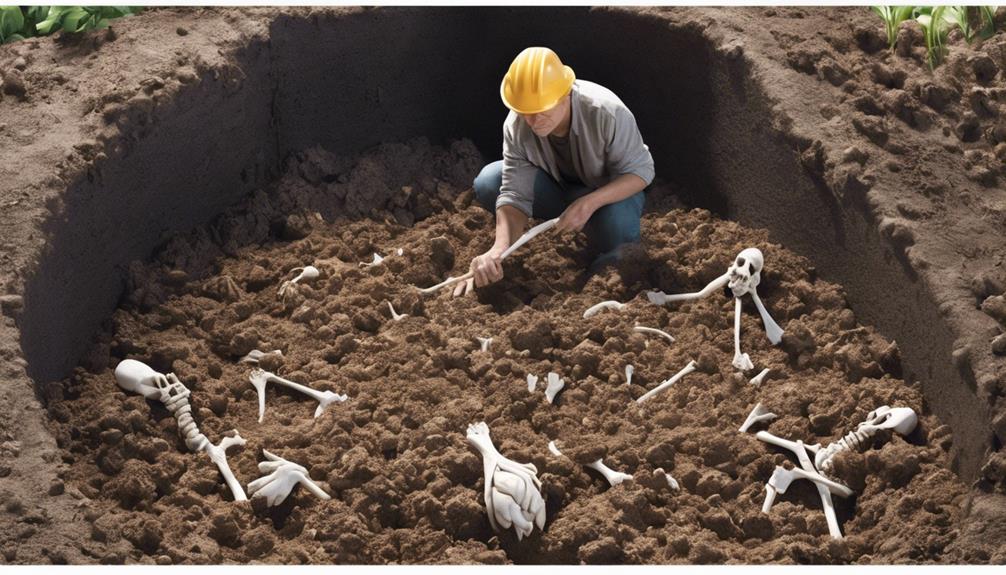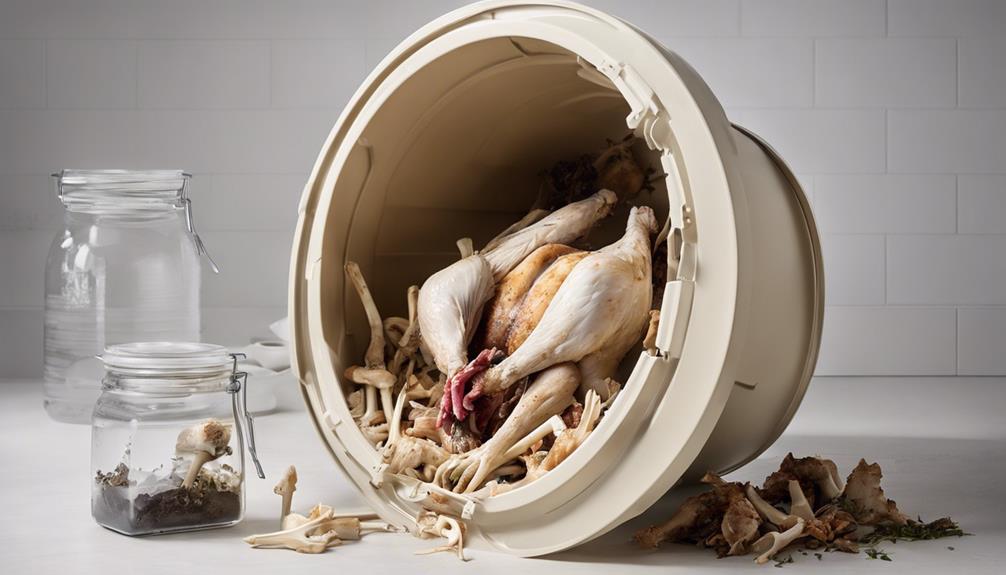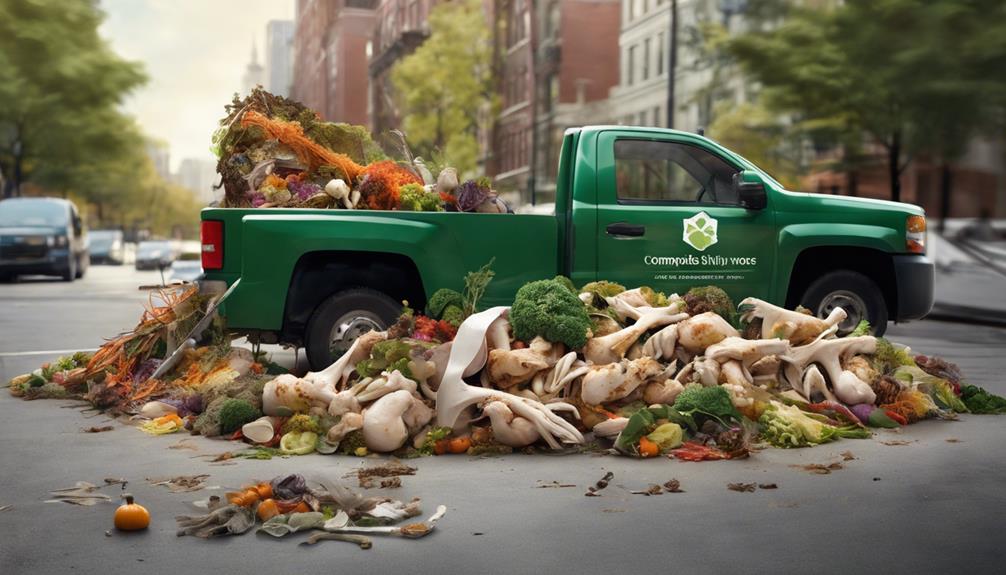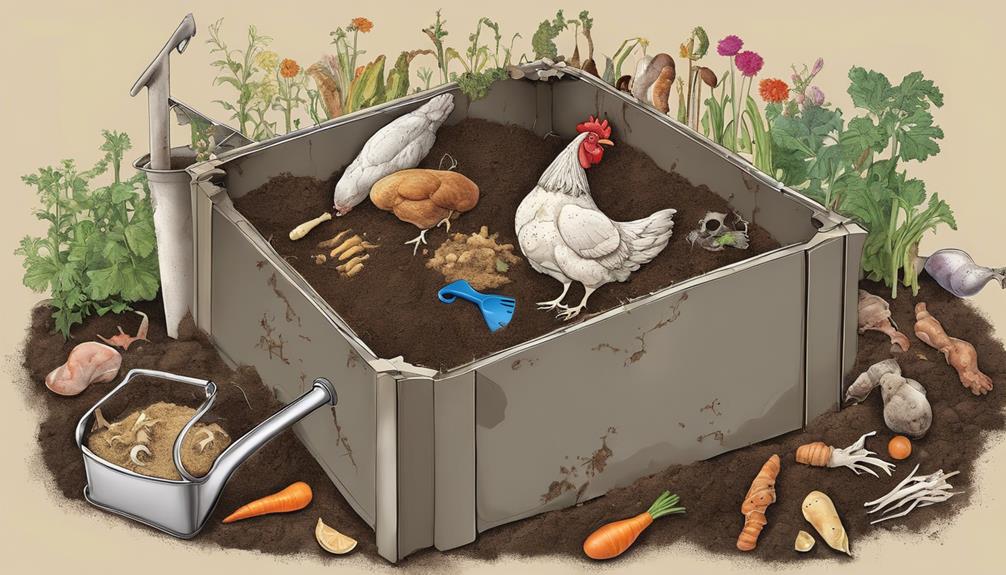Composting chicken bones is a straightforward method to produce nutrient-rich soil for your garden. You have the option to utilize Lomi for fast decomposition of soft bones and food scraps, or bury the bones in a compost pile for natural breakdown. The hot composting technique accelerates the decomposition process through high temperatures, while a Bokashi bin provides anaerobic fermentation for effective composting.
If you want to explore more easy ways to compost chicken bones, check out our diverse techniques for sustainable gardening.
Key Takeaways
- Utilize Lomi composting for swift conversion of chicken bones into nutrient-rich soil.
- Bury chicken bones in the center of a compost pile for natural decomposition.
- Opt for hot composting method to accelerate breakdown of chicken bones.
- Consider using a Bokashi bin for anaerobic fermentation of chicken bones.
- Participate in curbside organic collection services for convenient composting of chicken bones.
Composting With Lomi
Composting with Lomi offers a swift and efficient solution for turning soft, cooked chicken bones and other food waste into nutrient-rich soil within 24 hours. This organic process involves breaking down the organic matter into a valuable soil amendment through controlled decomposition.
Lomi's quick and efficient composting process is ideal for transforming small bones and meat remnants into nutrient-rich dirt suitable for sustainable gardening practices. By following guidelines and adding only approved materials to Lomi, one can ensure optimal composting results. The resulting compost from soft bones and food waste can be used to enhance plant growth or as a natural lawn fertilizer, promoting a sustainable approach to recycling organic materials.
It's important to note that while Lomi excels at composting soft, cooked chicken bones, it isn't designed for hard or large bones due to its rapid composting nature. Composting with Lomi presents a convenient and eco-friendly method for managing food waste and creating valuable organic soil amendments.
Bury Bones in Compost Pile

To effectively accelerate the decomposition of chicken bones, bury them in the center of a traditional compost pile and ensure they are covered with a balanced mix of composting materials. The heat generated within the compost pile plays a crucial role in breaking down the bones over time. Turning the compost pile regularly helps distribute this heat evenly, speeding up the decomposition process. Burying chicken bones in a compost pile is a natural way to recycle waste but requires patience, as it can take several months to a year for complete breakdown to occur.
| Aspect | Details | Importance |
|---|---|---|
| Placement | Center of compost pile | Ensures decomposition |
| Covering | Balanced mix of composting materials | Aids breakdown |
| Heat generation | Heat from compost accelerates breakdown | Essential process |
| Turning | Regular turning distributes heat | Speeds up breakdown |
| Time for breakdown | Several months to a year | Completion of process |
Hot Composting Method
How can we efficiently maintain high temperatures to accelerate the decomposition of chicken bones in hot composting?
Hot composting chicken bones involves creating an environment where the decomposition process is expedited by high temperatures, typically ranging between 140-160°F. To achieve this, a well-balanced mix of green (nitrogen-rich) and brown (carbon-rich) materials is essential. The green materials provide the necessary nutrients for the beneficial microbes responsible for breaking down the bones, while the brown materials help maintain proper aeration in the compost pile.
Regular turning of the compost pile is crucial in hot composting to ensure even decomposition and to prevent the pile from overheating or becoming too compacted.
Using a Bokashi Bin

Maintaining the optimal environment for anaerobic fermentation in a Bokashi bin is key to effectively decomposing chicken bones and other food waste. The airtight nature of the Bokashi bin creates a perfect setting for anaerobic fermentation, ensuring that organic waste like chicken bones can break down efficiently without emitting unpleasant odors.
By incorporating Bokashi bran into the bin, beneficial microbes are introduced, expediting the breakdown process. These microbes play a crucial role in decomposing the food scraps, including the sturdy chicken bones, resulting in a nutrient-rich soil amendment.
The Bokashi bin is a remarkable composting method for those seeking faster breakdown of organic waste, making it a suitable choice for individuals wanting to compost chicken bones effectively. By utilizing the Bokashi bin, one can transform what would typically be considered challenging compost material into a valuable resource for enriching garden soil and promoting healthy plant growth. Embracing this approach to composting not only minimizes food waste but also contributes to sustainable gardening practices.
Curbside Organic Collection Services

Utilizing curbside organic collection services in your area can significantly contribute to sustainable waste management practices by conveniently composting chicken bones and other food scraps directly from your home. These services offer residents organic collection bins to separate organic waste, including chicken bones, which are then picked up for processing at composting facilities.
The collected organic waste, including the chicken bones, is carefully processed and transformed into nutrient-rich soil. By participating in curbside organic collection services, you not only divert organic waste from landfills but also support the creation of valuable compost that enriches the soil.
This process not only reduces landfill waste but also fosters sustainable waste management practices that benefit the environment. Embracing these services is a practical way to contribute to a greener future by efficiently managing organic waste like chicken bones and food scraps.
Frequently Asked Questions
How Long Does It Take Chicken Bones to Decompose?
Chicken bones can take varying times to decompose fully, ranging from 6 months to 2 years. High temperatures can speed up this process.
Breaking bones into smaller pieces can also help them break down faster in a compost pile. Burying bones in warm locations can accelerate decomposition compared to cold composting methods.
Curbside organic collection services may provide an efficient solution for composting chicken bones.
How Do You Compost Chicken Remains?
When composting chicken remains, we prioritize safety and efficiency. Utilize cooking methods to reduce health risks and break bones into small pieces for faster decomposition.
Employ hot composting, bokashi bins, or Lomi techniques for optimal breakdown. Curbside organic collection services offer convenience where available.
Avoid composting raw bones to maintain safe practices. By adhering to these guidelines, we ensure a successful composting process while minimizing potential hazards.
How Do You Prepare Bones for Compost?
When preparing bones for composting, it's crucial to clean them thoroughly to remove any meat or residue.
Breaking down the bones into smaller pieces helps speed up decomposition.
Cooking the bones before composting can eliminate harmful bacteria and pests.
Consider methods like hot composting or a bokashi bin for efficient composting.
Proper preparation ensures successful decomposition and yields nutrient-rich compost.
Can You Throw Bones in Compost?
Yes, bones can be thrown in compost, but special care is needed for efficient breakdown. Cooking bones before composting reduces disease risk and pest attraction. Breaking bones into small pieces speeds up decomposition. Methods like hot composting, bokashi bins, or Lomi aid in effective chicken bone composting.
Some areas offer curbside organic collection services for convenient composting. Proper technique ensures bones integrate well into compost, enriching soil with valuable nutrients.
Can I Use Composted Chicken Bones as a Deterrent for Cats and Snakes?
Composted chicken bones can be used as a deterrent for cats and snakes. The sharp and prickly texture of the bones can dissuade them from venturing into your garden or yard. Using this natural method can prevent a potentially dangerous cat and snake tussle outcome.
Conclusion
In conclusion, composting chicken bones is a simple and efficient way to reduce waste and enrich your soil. Who'd have thought that something as seemingly inedible as bones could be turned into valuable nutrients for your garden?
By following these methods, you can easily compost chicken bones and contribute to a more sustainable environment. So next time you enjoy a delicious chicken dinner, remember that even the bones can be put to good use in your compost pile.









